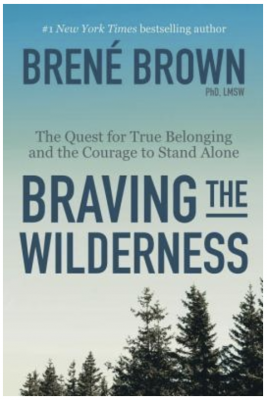Braving the Wilderness – Brené Brown
 (Sept. 2017) True belonging doesn’t require that you change who you are. It requires you to be who you are.
(Sept. 2017) True belonging doesn’t require that you change who you are. It requires you to be who you are.
This is another amazing book by Dr. Brené Brown, who previously wrote The Gifts of Imperfection, Daring Greatly, and Rising Strong.” She talks about writing this book against the backdrop of polarizing political and ideological chaos. In looking at some other reviews of this book, I am not surprised that there are people who are dismissive of the book based on their beloved writer having the audacity to “be political.” Which ironically is a wonderful illustration of the points this book sets out to make about true belonging and braving the wilderness.
Dr. Brown defines belonging as “an innate desire to be a part of something larger than us.” She goes on to say that our sense of belonging can never be greater than our level of self acceptance, and that being ourselves sometimes means standing alone.
Fitting in is not the same as belonging – in fact it can often be a barrier to it. One of the most poignant parts of the book is when she quotes groups of middle school students who came up with their own distinctions between these two concepts:
“Belonging is being somewhere you want to be, and they want you. Fitting in is being somewhere you want to be, but they don’t care one way or the other.”
“Belonging is being accepted for you. Fitting in is being accepted for being like everyone else.”
“If I get to be me, I belong. If I have to be like you, I fit in.”
She also goes on to talk about how some of these students share a sense of not belonging at home, how they feel like they aren’t living up to their parents’ expectations. Dr. Brown had her own experience of feeling disconnected from her family and points out that “not belonging in our families is still one of the most dangerous hurts. That’s because it has the power to break our heart, our spirit and our sense of self worth.”
She talks about four elements of true belonging and how the daily practice of these things can feel like a paradox. But a paradox is not inherently a bad thing. It requires us to consider two things simultaneously that may seem to be in conflict, or impossible to do at the same time. Her four elements:
People are hard to hate close-up. Move in.
Speak truth to bullshit. Be civil.
Hold hands. With strangers.
Strong back, soft front, wild heart.
She spends some time talking about bullshit as being a greater enemy of truth than even lies are. “Lying is a defiance of the truth. Bullshitting is a wholesale dismissal of the truth.”
She also uses BRAVING as an outline for what it takes in order to trust others. And also to engage in self trust.
B – Boundaries
R – Reliability
A – Accountability
V – Vault (keeping confidences and not speaking out of turn)
I – Integrity
N – Non-judgement (ask for what you need and accept what others need without judging them)
G – Generosity (not jumping to negative assumptions about the intention of others)
I admit that I am a fan of Dr. Brené Brown and love her other books. I’m just as enthusiastic about this one and think the subject is very timely. There are going to be people who don’t like some of her positions and perspectives because it does not align with their beliefs. She talks about Black Lives Matter and why All Lives Matter is not the same. She explains it’s not the same “because the humanity was not stripped from all lives the way it was from the lives of black citizens.” That you can’t undo that level of dehumanization in one or two generations. She goes on to say that it’s possible to care about the lives of police officers and the lives of black citizens and we should not be drawn into false dichotomies of either/or that seek “to shame us for not hating the right people.”
I am passionate in my belief that you can’t simply “opt out” of politics as if it’s something that doesn’t touch you. It touches everyone – it’s the foundation of how public policy is made and that creates the quality of life we have – for better or for worse. Abdicating interest, knowledge and participation in politics gives all your power to someone else – whose intentions and goals may not align with yours. In a democracy, everyone needs to be an informed participant.
I highly recommend this book. It provides excellent food for thought and some very practical suggestions for how to find belonging, even when that means standing alone.